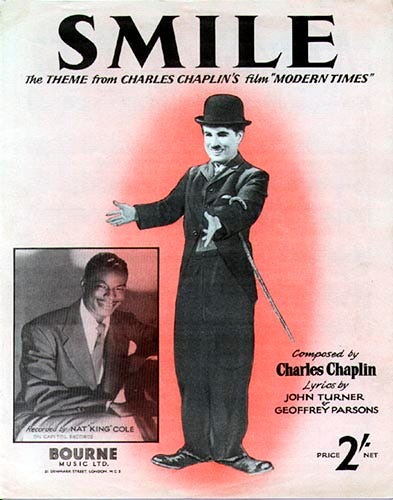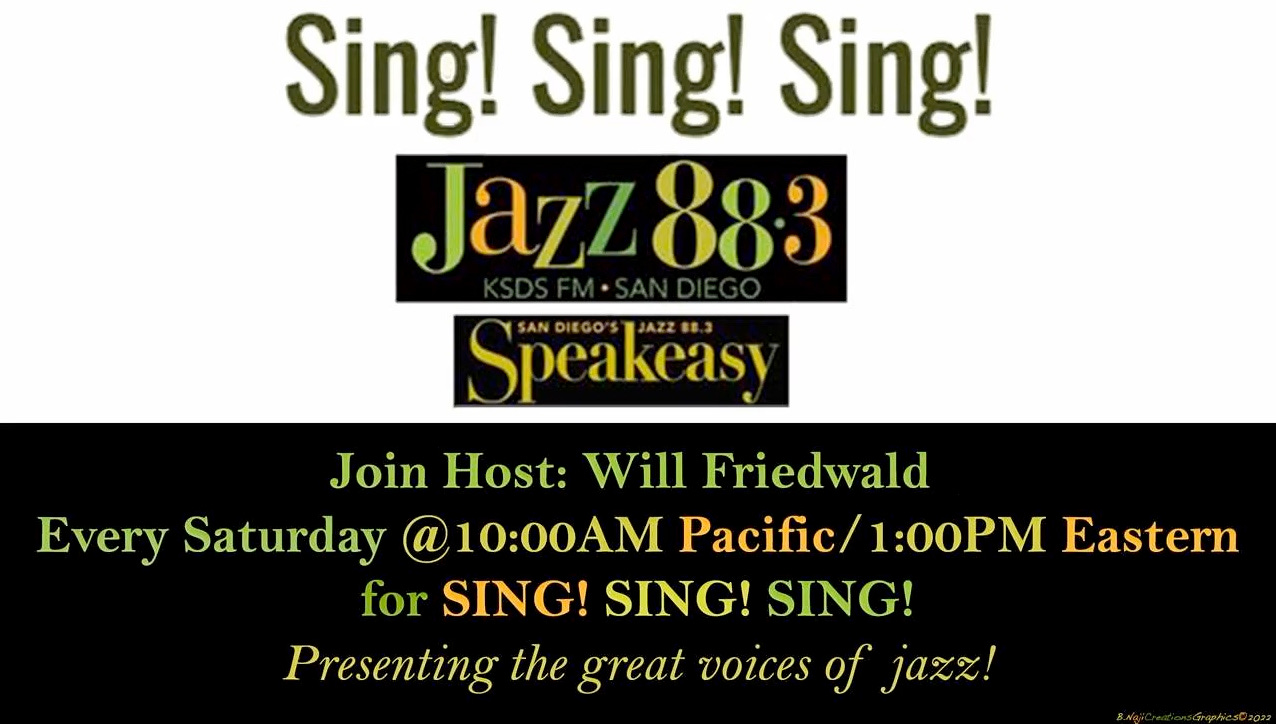At long last! Nat King Cole singing “Smile” live on The Ed Sullivan Show (1954)!
I can’t tell you how happy I am to see this!
In case you missed it, here’s my interview with Seth MacFarlane, and three recent stories and postings relating to his fine new album, Lush Life: The Lost Sinatra Arrangements.
The Wall Street Journal (June 14, 2025)
Substack 1 - “Shadows / No More Shadows”
Substack 2 - “Hurry Home”
SING! SING! SING!
With Seth MacFarlane: “Lush Life: The Lost Sinatra Arrangements”
(SSS #154 2025-06-28)
download: <or> play online:
“Smile”
Music by Charles Chaplin (with help from David Raksin)
Lyrics and adaptation by Geoffrey Turner and John Parsons
Ever since I started accumulating video of my favorite musical artists, and ever since there has been an Ed Sullivan Show channel on youtube.com, I have been waiting for the SOFA / Sullivan team to post this.

Up to now, I was happy to say that we have video footage, from TV shows, soundies, Snader Telescriptions, theatrical short subjects and even features, of the great Nat King Cole performing all of his hits and signature songs. Well, almost all of them, save for two: “Smile” and “L-O-V-E.” It’s easy to understand why Cole never performed “L-O-V-E”; that Bert Kaempfert number was the great pianist-singer’s final hit, and by the time the album was actually released, he was already on his deathbed.
But “Smile” is a different story. When the single was originally released in 1954, it reached #10 on the pop charts (#2 in the UK), which meant it was a sizable hit though hardly a blockbuster along the lines of “Nature Boy” or “Too Young.” However, as with “Unforgettable,” in 1951, this is a song that has acquired an even greater status as a leitmotiv of sorts for Cole in the 60 years since his death at age 45 in 1965. For instance, Cole never once sang “Smile” on his 1956-57 NBC-TV series, even though he pretty much got around to all of his most notable hits and standards, going back to the 1943 “Straighten Up and Fly Right.”
In the 70 years since the single release, and also on the album Ballads of the Day, “Smile” has become quintessential Nat King Cole - sung by other artists not only in his memory but in memory of the equally remarkable artist who gets credit for composing it.
As we know, “Smile” is based on a theme composed by the legendary comedian / actor / writer / director / composer / 20th century cultural icon Charlie Chaplin, and it is heard at several points through the soundtrack of his final silent film Modern Times (1936). Chaplin relied heavily on a young assistant to help him with that score - David Raksin, who, it is said, had been recommended to Chaplin by no less than George Gershwin himself. Raksin’s main job was to help ensure that Chaplin’s themes fit the onscreen action and synchronized properly, and it’s generally acknowledged that Raksin had significant input into the theme that later became “Smile.”
A pair of British songwriters, Geoffrey Parsons and John Turner (real name: James Phillips), had the brilliant idea to turn the Modern Times theme into a popular song. They perfectly captured the bittersweet mood of the film, indeed of the entire ethos of Charlie Chaplin, whose films were as sweetly sentimental as they were uproariously comic. The melody is essentially major with significant interludes of minor. “The first five bars are all over the ‘tonic’ (home key) major,” as Daniel Weinstein points out. “The first minor chord does not occur until the 7th bar of the song. The entire song is 32 bars, essentially an A-B-A-B structure, the A being 6 bars mostly in major, then 2 bars of minor leading to the B section, which is in minor until the 13 the bar of the song. I'd call it a major key song with significant minor key elements (well balanced for the bittersweet emotion conveyed in the lyrics.” It’s a bittersweet, very sad, minor key melody in which the words stress the reasons why you shouldn’t smile but specifically commend you to go ahead and smile - in the face of all that adversity - just the same.
1954 was clearly the banner year for Turner and Parsons - in that season they also scored with “Oh My Papa,” adapted from a 1939 German song, that became a mega-hit for the golden-voiced, rhythmically-challenged crooner Eddie Fisher. Still, “Smile” would be, by far, the team’s biggest hit - a very incomplete list at secondhandsongs.com lists 600 different recordings. (That’s a lot of smiling.)
Petula Clark with Accompaniment directed by Joe Henderson (July 1954)
The first recording of “Smile” as a proper song would seem to be by the 21-year-old British singer Petula Clark, who already had quite a career behind her as a child actor although the years of international superstardom were still a decade away. This arrangement of the song uses her voice as the lead in a small choir, rather like Sinatra with the Pied Pipers in his Tommy Dorsey days. Perhaps musical director Joe Henderson thought that “Smile” would make an appropriate follow up to “I’ll Never Smile Again.”
Nat King Cole
Single, with Nelson Riddle and his Orchestra (recorded July 27, 1954)
Toast of the Town (The Ed Sullivan Show) Broadcast live October 31, 1954
This is the hit version; you can tell how far Cole’s singing had come - ten years earlier, he would have had a much harder time putting across a lyric as subtle and nuanced as this. About five weeks after cutting his single, Cole sang “Smile” on the Colgate Comedy Hour, an episode I have never been able to find, and then he sang it on Sullivan on Halloween night. I have been waiting and wanting to see this forever - after 1954, he never sang it on television again or even on a live concert recording - a tiny, tantalizing snippet was included in one of the Cole documentaries a few decades ago and that’s all I have ever seen until a few weeks ago when the Sullivan channel (God bless ‘em) finally posted it.
The first thing you notice is that the arrangement is completely different; obviously, Cole figured that the Riddle arrangement was too complicated to take on the road, or even for the relatively ham-handed Ray Bloch to conduct. The actual Riddle chart uses an intriguing mixture of horns, classical brass and winds (there are low register french horns that produce a sound similar to Juan Tizol’s valve trombone), and strings; Bill Miller, for instance, doubles on piano and celeste. The good news is that the live version is enhanced by a lovely piano solo from Cole himself, which isn’t heard on the studio master. The Sullivan arrangement is much more conventional, playable by a standard jazz / dance big band, with emphasis on the saxophones.
Perhaps that’s the reason Cole stopped performing it live - the actual arrangement was too complicated to take out on the road and the replacement version wasn’t entirely satisfactory. It’s more or less the same reason that the Beatles never performed the Sgt. Pepper music - or that of any of their later albums - live.
The Nat King Cole Story (recorded March 24, 1961)
Cole sang and recorded the proper arrangement at least once more, in stereo, for his big three-LP project of 1961, The Nat King Cole Story. It’s Riddle’s arrangement as conducted by the formidable Ralph Carmichael. This is the version that most people have heard, and it should be noted that his vocal is even more accomplished and finely nuanced here than seven years earlier - although the 1954 original has charm of its own.
Tony Bennett
single, conducted by Ralph Burns (June 24, 1959)
The Movie Song Album, conducted by Johnny Mandel (December 27, 1965)
I’ll end with two lovely recordings by Tony Bennett, both in very slow ballad time, but very different from each other. This song was also a career perennial for Tony. I remember him singing it, I think it must have been at Radio City Musical Hall, wherein the house went dark, the big screen came down, and we were treated to silent snippets of Chaplin from Modern Times. Tony intended this as a tribute to two of the biggest influences in his life and music, Chaplin himself and Nat King Cole. Note that the 1965 Movie Song Album track heavily features the brilliant Tommy Flanagan, done at a moment when Tony was working with pianists other than Ralph Sharon and Flanagan was taking a hiatus from his 15-or-so-year tenure with Ella Fitzgerald. Father Flanagan plays a lovely intro at the start and is heard throughout, especially at the coda, and Tony doesn’t miss a single subtle nuance.
This truly makes me smile.
(Very special thanks to Elizabeth Zimmer & Dan Fortune for their expert proofing, hey!)
Coming on Wednesday July 9 @ 7:00PM, THE NEW YORK ADVENTURE CLUB presents 'Tony Bennett: Examining the Best Singer in the Business' Webinar (All presentations are available for replay viewing for one week after the live event. For more information & reservations, please click here.)
Sing! Sing! Sing! : My tagline is, “Celebrating the great jazz - and jazz-adjacent - singers, as well as the composers, lyricists, arrangers, soloists, and sidemen, who help to make them great.”
A production of KSDS heard Saturdays at 10:00 AM Pacific; 1:00 PM Eastern.
To listen to KSDS via the internet (current and recent shows are available for streaming) click here. Here is the running list of recent shows.
The whole series is also listenable on Podbean.com; click here.
SING! SING! SING!
July 4 Special: Every State in the 48 is Great
(SSS #155 2025-07-05)
download: <or> play online:
With Seth McFarlane: “Lush Life: The Lost Sinatra Arrangements”
(SSS #154 2025-06-28)
download: <or> play online:
LOUIS ARMSTRONG: International Satch (“A Wonderful World”)
(SSS #153 2025-06-21 - 2025 LOUIS ARMSTRONG BIRTHDAY SPECIAL)
download: <OR> play online:
INSIDE ART Dave Drexler interviews Will Friedwald re NIGHTS AT THE RED STEINWAY (2025-06-22)
download: <or> play online:
Father's Day (“My Old Man”)
(SSS #152 2025-06-14)
download: <or> play online:
Nelson Riddle
(SSS #29 2023-01-14)
download: <or> play online:
Let's Spring One! (Sing Sing Sing goes Spring Spring Spring!)
(SSS #149 2025-05-24 - Spring 2025, Part 2)
download: <or> play online:
The Charles Strouse Jazz & Pop Mixtape (RIP 1928-2025)
(SSS #062 2023-09-02)
download: <or> play online:
SLOUCHING TOWARDS BIRDLAND is a Substack newsletter by Will Friedwald. The best way to support my work is with a paid subscription, for which I am asking either $5 a month or $50 per year. Thank you for considering. (Thanks as always to Arlen Schumer for special graphics.) Word up, peace out, go forth and sin no more! (And always remember: “A man is born, but he’s no good no how, without a song.”)
Note to friends: a lot of you respond to my Substack posts here directly to me via eMail. It’s actually a lot more beneficial to me if you go to the Substack web page and put your responses down as a “comment.” This helps me “drive traffic” and all that other social media stuff. If you look a tiny bit down from this text, you will see three buttons, one of which is “comment.” Just hit that one, hey. Thanks!j
Slouching Towards Birdland (Will Friedwald's Substack) is a reader-supported publication. To receive new posts and support my work, consider becoming a free or paid subscriber.








my bad! I just realized that both of the Tony Bennett "Smile"(s) are the same performance - the 1965 MOVIE SONG ALBUM version. I'll fix the page, but the correct link to the 1959 version is here: https://youtu.be/8nUXccGz3ks?list=RD8nUXccGz3ks
thanks!
Fascinating info. Thanks for this. So well written and researched.